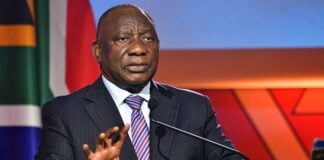The recent South African elections saw the African National Congress (ANC) face the most serious challenge since the end of apartheid. While it won comfortably, a new radical left-wing party has emerged, the Economic Freedom Fighters (EFF), with 6.35 per cent of the vote and 25 seats in the new parliament.
It is led by firebrand Julius Malema, the former president of the ANC Youth League, and stands for nationalising the mines and redistributing wealth from the rich. It supports striking miners and during the election was criticised for raising the slogan “Destroy e-tolls physically”, referring to South Africa’s toll-ways.
The EFF is now the third largest party in parliament. This is the first time a party to the left of the ANC has held this position.
The ANC’s vote slumped to 62.2 per cent—down from 65.9 per cent in 2009 and 69.7 per cent in 2004. As the party that led the struggle against apartheid, formerly led by Nelson Mandela, it still has enormous credibility. But this political capital is being eroded by its slavish adherence to pro-market neo-liberal economic policies.
The ANC was also helped by a discredited opposition that is even more pro-market and relies on the votes of privileged whites. There was also a very poor voter turnout.
Since the end of apartheid living standards for some blacks have advanced, but the vast majority remain in the same squalid conditions. South Africa today is one of the most unequal societies in the world. The ANC’s decision to spend billions building soccer stadiums and evicting slum dwellers to host the 2010 World Cup, rather than invest in decent infrastructure and services, is symbolic of its failure.
Until now, the ANC has been bolstered by its Tripartite Alliance with the Congress of South African Trade Unions (COSATU) and the South African Communist Party (SACP).
COSATU, like the ANC, has enormous credibility and played a crucial role in the struggle against apartheid. But once the ANC came to power, COSATU rapidly became bureaucratised and today is more concerned to help the ANC manage the economy than give a voice to those suffering under the government’s neo-liberal agenda.
But COSATU’s suffocating role is being challenged. New struggles are breaking out beyond its control and new militant non-affiliated unions have formed. There are also deep divisions emerging within COASTU.
After Marikana
An important turning point was the victorious wildcat strike of miners at Marikana in 2012. These miners were slandered as “criminal” by leading ANC officials and brutally attacked by the police. The strike hit the international headlines when 34 people were killed by police, some shot in the back, in an attempt to break the strike. The repression failed and the miners went on to win a 22 per cent wage rise that inspired others. In its aftermath South Africa was hit by a wave of strikes, many of them unofficial.
A new union, the Association of Mineworkers and Construction Union (AMCU), which is not aligned to the ANC, has grown rapidly out of the labour upheaval and it is now the principle union in the economically important platinum sector, displacing the National Union of Mineworkers, one of COSATU’s key affiliates.
As Solidarity goes to press, around 80,000 platinum miners in the AMCU have been on strike for three months demanding a living wage of 12,500 rand ($1288) a month. This strike is a serious challenge to the ANC. The miners are yet to buckle.
The EFF polled strongly in platinum areas in the recent election.
Meanwhile a bitter dispute is taking place within COSATU. The National Union of Metalworkers of South Africa (NUMSA), COSATU’s largest affiliate, convened a special congress in December last year and voted not to campaign for the ANC in the upcoming elections. They are bitter about the ANC’s failure to defend South Africa’s manufacturing industries and the use of state repression again workers. They accuse the ANC of failing, “to break down the apartheid capitalist colonial economy”.
They are calling for COSATU to split from the Tripartite Alliance. NUMSA declared there is “no turning back” after the election, and are currently convening conferences to discuss establishing a united front—similar to the anti-apartheid United Democratic Front—to fight neo-liberalism and contest elections and in the longer term, as the basis for a new workers’ party. NUMSA, too, is currently considering ways of giving solidarity to the platinum miners.
The left opposition in South Africa is far from coherent and no doubt involves some opportunists. But there is scope for further breaks from the ANC and a radicalisation amongst workers that can start to complete the unfinished business of the anti-apartheid struggle.
By Mark Gillespie





